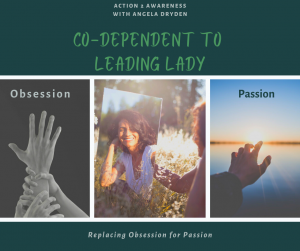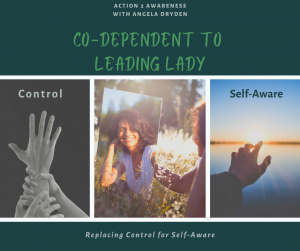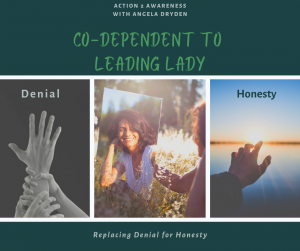
5 Tips for a Great Presentation
Tony Robins shares that we as humans have human needs and they are, certainty, variety, connection, contribution, growth, and significance. In daily life, you can

The beginning can be the hardest part of any process. Facing such behaviors as Obsession, Control and Denial can seem almost daunting. These three are the first behaviors needing to be unraveled because they are behaviors Co-Dependents often see in others but not in themselves. We don’t get rid of a behavior, we change it. Let’s explore possible ideas to replace these behaviors with new ones that will make the impossible seem possible and provide you a new viewpoint…if you are open to it.

Do you worry about things that have not happened and find yourself creating scenarios of “what ifs?” Focusing on others is a co-dependent’s Obsession. Ask yourself the question “What do I want?” If Your reply includes other people, or certain situations, needing to change so you can have what you want, or using someone outside of you as the excuse (“I can’t because of them”) then that is a sign you are portraying obsession.
Let me offer a thought, what if you try on Passion instead? Having Passion will increase your ability to see the good in others and help you focus on what you are creating in your life. What are you passionate about? How can this passion fuel your zest for life? Could it be possible that as you grow your passion you become open to allowing your loved ones to explore life as you explore yours?

Control is a sneaky one for us co-dependents as we “only want the best” for others and are trying to make it “all okay,” so we don’t see it as control. In fact, most of the time we see our loved ones as controlling us. My question here is direct and simple: why do you want to be in charge to make everyone feel okay and what power do you hold that you believe you can make people feel anything? Self-Awareness is a beautiful behavior to engage in as you explore the link between control to how you are showing up to your loved ones. Understanding that self-awareness is not a judgment on yourself but rather curiosity on how you might do things now that you are seeing it through new eyes. Asking yourself questions like, “Was I trying to be right? What would happen if I just listened?” will help cultivate more self-awareness.

Denial goes hand in hand with the other two, we will excuse the heck out of everything we do to prove to ourselves we are doing the right thing. This trait will and can stay hidden until you are ready to go after what you want and let go of others. We can become so good at giving our viewpoint and playing the victim. But, showing up and taking down the wall of denial can be life changing. Honesty with yourself is the best way to combat denial. Honesty is best when looking at a scenario from the viewpoint of an outsider and taking out emotions, body language, and words exchanged. Instead, try to focus on the topic—why the disagreement started and how you might see your loved one’s point of view; honesty, without emotions, so you just see the facts.
As you work on trading Obsession for Passion, Control for Self-Awareness, and Denial to Honesty, you may encounter some obstacles. Adopting new ways of thinking as you replace old habits is a process. For some, it’s an awakening and for others, it will take more time to see the change. The point of the journey is to break old patterns as you look for new behaviors that help serve you in finding your voice.
These thoughts and perspectives that I share as you trade one behavior for another are just the tip of the iceberg. Becoming open to the possibility that change, in you can happen, will help you begin to believe you can learn new behaviors. As your coach, I will help you find your way. Your sessions with me will bear fruit long after they are over. Let’s get your free consultation scheduled today so you can see how I help clients view their own thinking as they decide to change.
Get the Zoom link sent to your inbox and join the live call of the week.

Tony Robins shares that we as humans have human needs and they are, certainty, variety, connection, contribution, growth, and significance. In daily life, you can

Positive Thinking I love a great positive thought as much as the next person, daily affirmations, and aspiring quotes used to be a part of

I was at the store and saw many men buying chocolates, flowers, and stuffed animals. As a lady that will be married 24 years on

As a culture, we have gotten a little confused about the difference between worth and value in my opinion. A few things have helped me